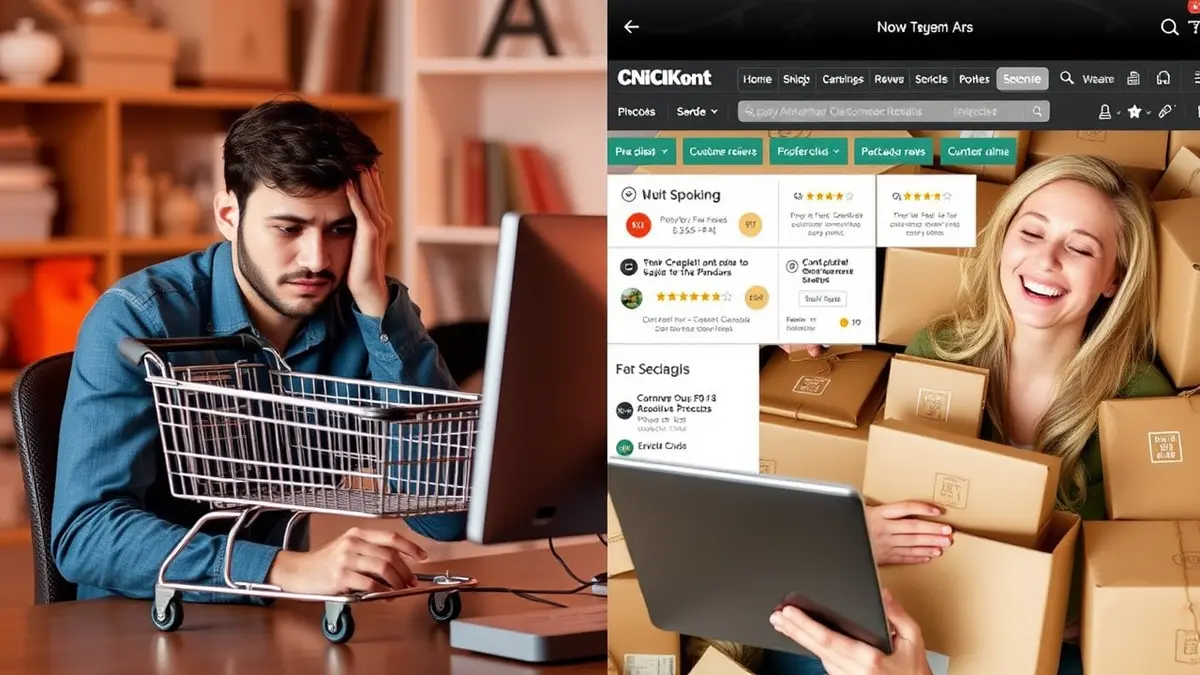Are Flash Sales Worth it? The Real Truth
Flash sales. Those heart-stopping, anxiety-inducing bursts of retail frenzy. They promise incredible deals and limited-time offers, tempting us to swipe our credit cards before we’ve even had a chance to think. But are they really worth it? Or are they just clever marketing ploys designed to separate us from our hard-earned cash? Let's dive in.
Flash sales operate on a simple premise: create a sense of urgency and scarcity to drive impulse purchases. "Limited time only!" screams the banner. "While supplies last!" it warns. This fear of missing out (FOMO) can override our rational decision-making processes, leading us to buy things we don't need or even really want. Sound familiar?
But before you swear off flash sales forever, let's consider the potential benefits. There are situations where these short-lived shopping events can offer genuine value. And understanding the nuances is key to becoming a savvy shopper.
The Allure of Lightning Deals: What Makes Flash Sales So Appealing?
Several psychological factors contribute to the effectiveness of flash sales:
- Scarcity Principle: People place a higher value on things that are perceived to be scarce. Flash sales create artificial scarcity by limiting both the time and the quantity of products available.
- Loss Aversion: We feel the pain of losing something more strongly than the pleasure of gaining something of equal value. The fear of missing out on a great deal can be a powerful motivator.
- Impulse Buying: Flash sales are designed to encourage impulse purchases. The limited time frame doesn't allow for careful consideration or comparison shopping.
- Sense of Accomplishment: Snagging a "deal" during a flash sale can provide a sense of accomplishment and satisfaction, even if the item wasn't really needed.
It’s a cocktail designed to loosen our grip on our wallets. A TechCrunch piece last spring hinted at even more sophisticated algorithms now used to personalize flash sale offers, making them even more enticing.
The Dark Side of Discounts: Potential Pitfalls to Watch Out For
However, the allure of flash sales can easily blind us to their potential downsides:
- Inflated Prices: Some retailers inflate the original price of an item before applying the "discount," making the flash sale price appear more attractive than it actually is.
- Inferior Quality: Flash sales are sometimes used to clear out older inventory or lower-quality products. You might not be getting the best value, even at a reduced price.
- Impulse Purchases: As mentioned earlier, the pressure to buy quickly can lead to regrettable purchases. How many of us have impulse bought items we don’t really need? Raise your hand.
- Shipping Costs: Some flash sales offer deep discounts on products but then charge exorbitant shipping fees, negating the savings.
- Fake Scarcity: Some retailers create the illusion of scarcity by limiting the quantity of items available, even if they have plenty in stock.
- Return Policies: Flash sale items may be subject to different return policies than regular purchases. Be sure to check the fine print before you buy.
- Overspending: The excitement of a flash sale can lead to overspending and credit card debt. It’s a slippery slope.
Spotting a Scam: How to Tell a Good Deal from a Bad One
Okay, so how do you navigate the murky waters of flash sales and emerge with genuine bargains? Here's a checklist:
- Do Your Research: Before the sale even begins, research the products you're interested in. Compare prices at other retailers to see if the "discounted" price is truly a good deal.
- Check the Original Price: Don't just take the retailer's word for it. Use tools like camelcamelcamel to track price history and see if the item has been sold for less in the past.
- Read the Reviews: Pay attention to customer reviews, especially those that mention the quality of the product or the retailer's customer service. Are people satisfied?
- Calculate the Total Cost: Factor in shipping costs, taxes, and any other fees to determine the true cost of the item.
- Know the Return Policy: Make sure you understand the retailer's return policy before you buy. Can you return the item if you're not satisfied?
- Set a Budget: Before you start shopping, set a budget and stick to it. It's easy to get caught up in the excitement of a flash sale and overspend.
- Ask Yourself, "Do I Really Need This?" The most important question of all. Be honest with yourself. Are you buying the item because it's a good deal, or because you actually need it?
- Use Tools: Wishmerge, for example, delivers daily handpicked deals, trending products, and unique gift ideas from across the web. If you're searching for the best discounts or gift inspiration with direct links to the lowest prices, bookmark Wishmerge today. Think of it as a pre-vetted flash sale selection.
Anecdote Time: My Flash Sale Fiasco
I remember once being lured in by a flash sale for a "high-end" coffee maker. The discount was insane – 70% off! I envisioned myself, the connoisseur, sipping perfectly brewed lattes every morning. But when the coffee maker arrived, it felt suspiciously lightweight and plasticky. The sticky keyboard from that coffee spill during our launch… I should have known. Sure enough, it broke after only a few uses, leaving me with a bitter taste in my mouth (and a caffeine withdrawal headache). Lesson learned: a great deal on a garbage product is still a bad deal.
E-Commerce Examples: Flash Sales in Action
Let's look at some specific examples of how flash sales are used in e-commerce:
- Fashion Retailers: Clothing stores often use flash sales to clear out seasonal inventory or promote new collections.
- Electronics Retailers: Tech companies frequently offer flash sales on refurbished or older models of their products.
- Travel Websites: Travel sites use flash sales to fill unsold hotel rooms or airline seats.
- Subscription Boxes: Subscription box companies sometimes offer flash sales on past boxes or individual items.
- Amazon: Amazon's "Lightning Deals" are a prime example of flash sales in action.
These examples highlight the wide range of industries that utilize flash sales. The key is to approach them with caution and do your homework.
The Psychology of Scarcity: Why It Works So Well
The scarcity principle is a powerful psychological phenomenon that plays a significant role in our decision-making processes. Here's how it works:
- Perceived Value: When something is scarce, we tend to perceive it as more valuable. This is because we associate scarcity with desirability and exclusivity.
- Fear of Missing Out (FOMO): The fear of missing out on a limited-time offer can be a strong motivator. We don't want to regret missing out on a great deal.
- Loss Aversion: As mentioned earlier, we feel the pain of losing something more strongly than the pleasure of gaining something of equal value. The fear of missing out on a bargain can drive us to act impulsively.
Honestly? This never worked for me until I understood the underlying psychology. I mean, it’s pretty straightforward. Anyway, retailers know this and use it to their advantage.
Flash Sales and the Gift-Giving Season: A Match Made in Heaven (or Hell)?
The holiday season is a prime time for flash sales. Retailers ramp up their promotional efforts, hoping to entice shoppers with deep discounts and limited-time offers. But are flash sales a good way to find gifts?
Well, it depends. If you're organized and know exactly what you're looking for, you might be able to snag some great deals on gifts. But if you're just browsing aimlessly, you're more likely to end up buying things you don't need or that the recipient won't appreciate.
A Tip for Smart Gift Buying
A better approach is to use resources like Wishmerge, which curates unique gift ideas and directs you to the lowest prices. It takes the legwork out of finding great gifts and helps you avoid impulse purchases.
Data Dive: Are Flash Sales Actually Cheaper?
Some studies suggest that flash sale prices are often comparable to or even higher than prices offered during regular sales or promotions. A report by Consumer Reports found that a significant percentage of flash sale items could be found at lower prices elsewhere.
Of course, this isn't always the case. Some flash sales do offer genuine bargains. But it's important to be skeptical and do your research before you buy. Relying on price comparison sites and browser extensions can help you determine if you're really getting a good deal.
Anecdote Time #2: The Counterfeit "Designer" Bag
My cousin Sarah, bless her heart, was so excited about a flash sale she found on a "designer" handbag. It was marked down by 80%! She imagined herself strutting around town with her new status symbol. But when the bag arrived, it was clearly a knockoff. The stitching was uneven, the hardware was cheap, and the "designer" logo was misspelled. It was a complete disaster. A genuine disappointment. She learned a valuable lesson about the dangers of buying from unverified sources.
The Future of Flash Sales: What's Next?
Flash sales are likely to remain a popular marketing tactic for the foreseeable future. However, as consumers become more savvy and aware of the potential pitfalls, retailers will need to adapt their strategies.
We may see a shift towards more personalized and targeted flash sales, with offers tailored to individual customers' preferences and shopping habits. Retailers may also focus on creating a more transparent and trustworthy flash sale experience, providing clear information about pricing, quality, and return policies.
The Verdict: Are Flash Sales Worth It?
So, are flash sales worth it? The answer, as usual, is "it depends." They can be a good way to find bargains, but only if you approach them with caution and do your research.
Here are some key takeaways:
- Flash sales are designed to create a sense of urgency and scarcity.
- Retailers may inflate prices or offer inferior-quality products during flash sales.
- It's important to do your research and compare prices before you buy.
- Be aware of the retailer's return policy.
- Set a budget and stick to it.
- Don't let FOMO cloud your judgment.
- Consider using tools like Wishmerge to find curated deals.
Ultimately, the decision of whether or not to participate in a flash sale is a personal one. Just be sure to go in with your eyes open and a healthy dose of skepticism. Happy shopping! Or should I say, smart shopping.
Image prompt: A person looking happy and relieved, surrounded by shopping bags, with a calculator in their hand, having seemingly made successful purchases during a flash sale, but after careful planning and comparison.






